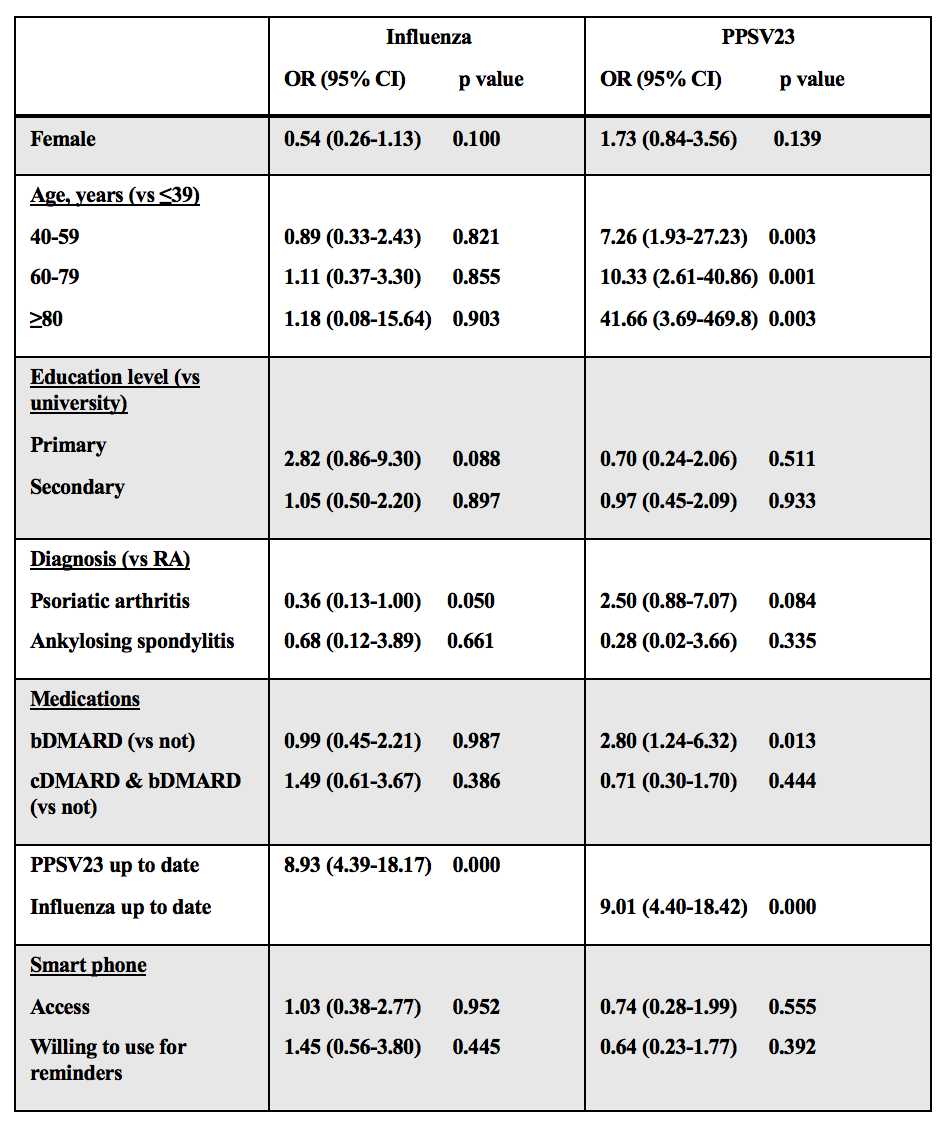Session Information
Session Type: Poster Session (Tuesday)
Session Time: 9:00AM-11:00AM
Background/Purpose: The ACR and CDC recommend influenza (“flu”) and 23-valent pneumococcal polysaccharide (PPSV23) vaccination for inflammatory arthritis (IA) patients on immunosuppression. This study aimed to: 1). assess barriers to vaccination and 2). increase PPSV23 (5 yearly) and “flu” (annual) vaccination uptake in immunosuppressed IA outpatients through a multifaceted quality improvement (QI) intervention.
Methods: The primary outcome was adequate “flu” and PPSV23 vaccination uptake of immunosuppressed IA outpatients. Consecutive outpatients in 2017 were invited to complete an anonymous 23 question paper questionnaire including demographic, diagnostic, medication and vaccination (knowledge, status and barriers) data. Patients taking oral steroids, biologic disease modifying antirheumatic drugs (bDMARDs) or immunosuppressant conventional synthetic agents (csDMARDs) were included. Simultaneously, a low cost multifaceted QI intervention was performed (Figure 1).
In 2018, post-intervention, the clinic was re-assessed. Binary logistic regression analysis was used to assess for independent predictors of up-to-date vaccination.
Results: In 2017-2018, 163 and 262 patients, respectively, met inclusion criteria. Patients were typical of an IA clinic (74% women; 45.4% ≥60 years old; 72.7% RA; 61.1% using csDMARDs; 46.6% using bDMARDs; 23.1% using combination csDMARD plus bDMARD; 32.5% using oral steroids).
In 2017, 104 (65.4%) knew of the increased infectious risk with IA. In 2018, 168 (65.6%) were aware. In 2017, 111 (69.8%) were aware of increased infection risk with medications;172 (66.9%) in 2018.
Vaccination awareness was higher for “flu” (Table 1). General practitioners (GPs) informed and vaccinated most patients. The most common reason for non-vaccination was lack of awareness. This decreased post intervention. 70% of patients had smart phone access. 78% were willing to use this for vaccination reminders.
PPSV23 vaccination rates increased from 41.0% to 47.2% (P=0.29. Pearson Chi squared), and “flu” from 61.8% to 62.1% (P=0.95, Pearson Chi squared).
Age, bDMARD use and up-to-date influenza vaccination were significant predictors of PPSV23 vaccination (Table 2). Only, up-to-date PPSV23 vaccination predicted “flu” vaccination.
Conclusion: “Flu” and PPSV23 vaccination rates were suboptimal and increased marginally post intervention. Overall, < 5% of vaccinations were in hospital. New strategies to increase vaccination including point-of-care vaccination in clinic and guidelines advocating specialists sharing responsibility with GPs are required.
To cite this abstract in AMA style:
Murray K, Low C, Young F, O'Rourke A, Callanan I, Feeney E, Veale D. A Quality Improvement Intervention to Improve Influenza and Pneumococcal Vaccination Rates in Immunosuppressed Inflammatory Arthritis Outpatients [abstract]. Arthritis Rheumatol. 2019; 71 (suppl 10). https://acrabstracts.org/abstract/a-quality-improvement-intervention-to-improve-influenza-and-pneumococcal-vaccination-rates-in-immunosuppressed-inflammatory-arthritis-outpatients/. Accessed .« Back to 2019 ACR/ARP Annual Meeting
ACR Meeting Abstracts - https://acrabstracts.org/abstract/a-quality-improvement-intervention-to-improve-influenza-and-pneumococcal-vaccination-rates-in-immunosuppressed-inflammatory-arthritis-outpatients/



